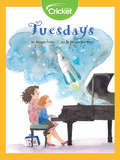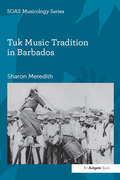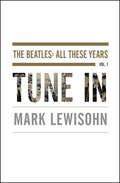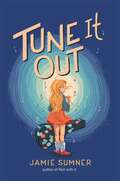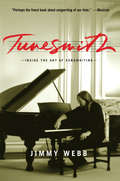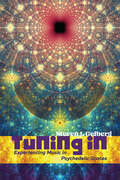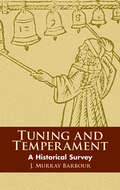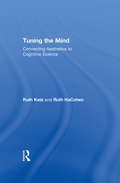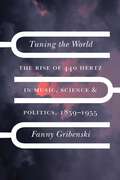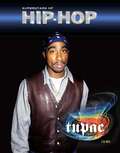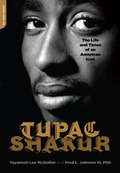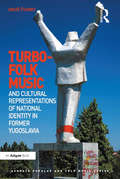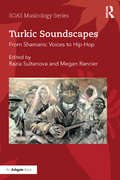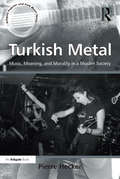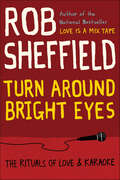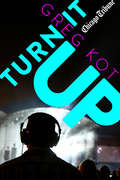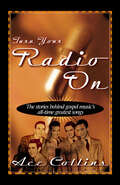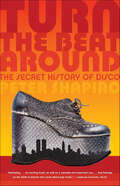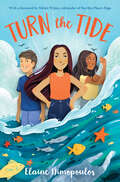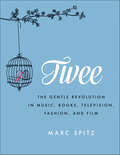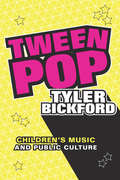- Table View
- List View
Try This At Home: THE SUNDAY TIMES BESTSELLER
by Frank TurnerThe brand new memoir from the Sunday Times bestselling author of The Road Beneath My Feet. Taking 36 songs from his back catalogue, folk-punk icon Frank Turner explores his songwriting process. Find out the stories behind the songs forged in the hedonistic years of the mid-2000s North London scene, the ones perfected in Nashville studios, and everything in between. Some of these songs arrive fully-formed, as if they've always been there, some take graft and endless reworking to find 'the one'. In exploring them all, Turner reflects with eloquence, insight and self-deprecating wit on exactly what it is to be a songwriter. From love songs and break-up songs to political calls-to-arms; songs composed alone in a hotel room or in soundcheck with the Sleeping Souls, this brilliantly written memoir is a must-have book for FT fans and anyone curious about how to write music.(P)2019 Headline Publishing Group Ltd
Try This At Home: THE SUNDAY TIMES BESTSELLER
by Frank Turner*THE SUNDAY TIMES BESTSELLER*The brand new memoir from the Sunday Times bestselling author of The Road Beneath My Feet. Taking 36 songs from his back catalogue, folk-punk icon Frank Turner explores his songwriting process. Find out the stories behind the songs forged in the hedonistic years of the mid-2000s North London scene, the ones perfected in Nashville studios, and everything in between. Some of these songs arrive fully-formed, as if they've always been there, some take graft and endless reworking to find 'the one'. In exploring them all, Turner reflects with eloquence, insight and self-deprecating wit on exactly what it is to be a songwriter. From love songs and break-up songs to political calls-to-arms; songs composed alone in a hotel room or in soundcheck with the Sleeping Souls, this brilliantly written memoir - featuring exclusive photos of handwritten lyrics and more - is a must-have book for FT fans and anyone curious about how to write music.
Try This At Home: THE SUNDAY TIMES BESTSELLER
by Frank Turner*THE SUNDAY TIMES BESTSELLER*The brand new memoir from the Sunday Times bestselling author of The Road Beneath My Feet. Taking 36 songs from his back catalogue, folk-punk icon Frank Turner explores his songwriting process. Find out the stories behind the songs forged in the hedonistic years of the mid-2000s North London scene, the ones perfected in Nashville studios, and everything in between. Some of these songs arrive fully-formed, as if they've always been there, some take graft and endless reworking to find 'the one'. In exploring them all, Turner reflects with eloquence, insight and self-deprecating wit on exactly what it is to be a songwriter. From love songs and break-up songs to political calls-to-arms; songs composed alone in a hotel room or in soundcheck with the Sleeping Souls, this brilliantly written memoir - featuring exclusive photos of handwritten lyrics and more - is a must-have book for FT fans and anyone curious about how to write music.
Tuesdays
by Rhonda TelferFinn is reluctant to go to piano lessons, but when Miss Bea shows him how the instrument works, he begins to discover the magic of music.
Tuk Music Tradition in Barbados (SOAS Musicology Series)
by Sharon MeredithBarbados is a small Caribbean island better known as a tourist destination rather than for its culture. The island was first claimed in 1627 for the English King and remained a British colony until independence was gained in 1966. This firmly entrenched British culture in the Barbadian way of life, although most of the population are descended from enslaved Africans taken to Barbados to work on the sugar plantations. After independence, an official desire to promulgate the country’s African heritage led to the revival and recontextualisation of cultural traditions. Barbadian tuk music, a type of fife and drum music, has been transformed in the post-independence period from a working class music associated with plantations and rum shops to a signifier of national culture, played at official functions and showcased to tourists. Based on ethnographic and archival research, Sharon Meredith considers the social, political and cultural developments in Barbados that led to the evolution, development and revival of tuk as well as cultural traditions associated with it. She places tuk in the context of other music in the country, and examines similar musics elsewhere that, whilst sharing some elements with tuk, have their own individual identities.
Tune In
by Mark LewisohnTune In is the first volume of All These Years--a highly-anticipated, groundbreaking biographical trilogy by the world's leading Beatles historian. Mark Lewisohn uses his unprecedented archival access and hundreds of new interviews to construct the full story of the lives and work of John Lennon, Paul McCartney, George Harrison, and Ringo Starr. Ten years in the making, Tune In takes the Beatles from before their childhoods through the final hour of 1962--when, with breakthrough success just days away, they stand on the cusp of a whole new kind of fame and celebrity. They've one hit record ("Love Me Do") behind them and the next ("Please Please Me") primed for release, their first album session is booked, and America is clear on the horizon. This is the lesser-known Beatles story--the pre-Fab years of Liverpool and Hamburg--and in many respects the most absorbing and incredible period of them all. Here is the complete and true account of their family lives, childhoods, teenage years and their infatuation with American music, here is the riveting narrative of their unforgettable days and nights in the Cavern Club, their laughs, larks and adventures when they could move about freely, before fame closed in. For those who've never read a Beatles book before, this is the place to discover the young men behind the icons. For those who think they know John, Paul, George, and Ringo, it's time to press the Reset button and tune into the real story, the lasting word.From the Hardcover edition.
Tune It Out
by Jamie SumnerFrom the author of the acclaimed Roll with It comes a moving novel about a girl with a sensory processing disorder who has to find her own voice after her whole world turns upside down.Lou Montgomery has the voice of an angel, or so her mother tells her and anyone else who will listen. But Lou can only hear the fear in her own voice. She&’s never liked crowds or loud noises or even high fives; in fact, she&’s terrified of them, which makes her pretty sure there&’s something wrong with her. When Lou crashes their pickup on a dark and snowy road, child services separate the mother-daughter duo. Now she has to start all over again at a fancy private school far away from anything she&’s ever known. With help from an outgoing new friend, her aunt and uncle, and the school counselor, she begins to see things differently. A sensory processing disorder isn&’t something to be ashamed of, and music might just be the thing that saves Lou—and maybe her mom, too.
Tunesmith: Inside the Art of Songwriting
by Jimmy WebbWebb brings his insider's knowledge, experience, and star power to the ultimate guide for aspiring songwriters. With a combination of anecdotes, meditation, and advice, he breaks down the creative process from beginning to end--from coping with writer's block, to song construction, chords, and even self-promotion. Webb also gives readers a glimpse into the professional music world.
Tuning In: Experiencing Music in Psychedelic States
by Steven J. GelbergThe first authoritative study of the important role of music in psychedelic use and the ways in which psychedelics provide unprecedented access to the deeper mysteries of music.Tuning In is the first authoritative study of a subject that is of wide and growing importance within the current psychedelic renaissance: the role and experience of music in personal growth and healing via psychedelics. The book brings together the best insights and creative musings on the subject from respected figures within the psychedelic community. Going back several decades (and beyond), this book includes first-hand testimony from numerous "trip reports," along with relevant insights from psychologists, scientists, philosophers, scholars of religion, musicologists, musicians, and mystics. Tuning In takes an experiential approach to understanding the unique synergy between psychedelic states and music: how music profoundly supports and enhances psychedelic sessions while psychedelic states provide a unique doorway into the inner mysteries of music. Author Steven J. Gelberg includes helpful guidance in assessing and choosing music appropriate for psychedelic sessions, along with links to curated music playlists.
Tuning and Temperament: A Historical Survey
by J. Murray BarbourThe demands of tuning (attaining the perfect scale) and temperament (the compromises necessary for composing in every key) have challenged musicians from the earliest civilizations onward. This guide surveys these longstanding problems, devoting a chapter to each principal theory and offering a running account of the complete history of tuning and temperament. Organized chronologically, the book features a helpful glossary and numerous illustrative tables, and it requires minimal background in music theory. This new reissue is currently the only edition in print of a much-quoted classic. 9 figures. 180 tables.
Tuning the Mind: Connecting Aesthetics to Cognitive Science
by Ruth HaCohenStarting from the late Renaissance, efforts to make vocal music more expressive heightened the power of words, which, in turn, gave birth to the modern semantics of musical expression. As the skepticism of seventeenth-century science divorced the acoustic properties from the metaphysical qualities of music, the door was opened to dicern the rich links between musical perception and varied mental faculties. In Tuning the Mind, Ruth Katz and Ruth HaCohen trace how eighteenth century theoreticians of music examined anew the role of the arts within a general theory of knowledge.As the authors note, the differences between the physical and emotional dimensions of music stimulated novel conceptions and empirical inquiries into the old aesthetic queries. Tracing this development, their opening chapter deals with seventeenth-century epistemological issues concerning the artistic qualities of music. Katz and HaCohen show that painting and literature displayed a comparable tendency toward "musicalization," whereby the dynamic of forms-the modalities specific to each artistic medium-rather than subject matter was believed to determine expression. Katz and HaCohen explore the ambiguities inherent in idealization of an art form whose mimetic function has always been problematic. They discuss the major outlines of this development, from Descartes to Vico through Condillac. Particular emphasis is placed on eighteenth-century British thinkers, from Shaftesbury to Adam Smith, who perceived these problems in their full complexity. They also explore how the French and the Germans dealt differently with questions that preoccupied the British, each nation in accordance with their own past tradition and tendencies. The concluding chapter summarizes the parallel development of abstract art and basic hypotheses concerning the mind and explores basic theoretical questions pertaining to the relationship between perception and cognition.In addressing some of the most complex problems in musical aesthetics, Katz and HaCohen provide a unique historical perspective on the ways their art creates and develops coherent worlds, and, in so doing, contribute to our understanding of the workings of the mind.
Tuning the World: The Rise of 440 Hertz in Music, Science, and Politics, 1859–1955 (New Material Histories of Music)
by Fanny GribenskiTuning the World tells the unknown story of how the musical pitch A 440 became the global norm. Now commonly accepted as the point of reference for musicians in the Western world, A 440 hertz only became the standard pitch during an international conference held in 1939. The adoption of this norm was the result of decades of negotiations between countries, involving a diverse group of performers, composers, diplomats, physicists, and sound engineers. Although there is widespread awareness of the variability of musical pitches over time, as attested by the use of lower frequencies to perform early music repertoires, no study has fully explained the invention of our current concert pitch. In this book, Fanny Gribenski draws on a rich variety of previously unexplored archival sources and a unique combination of musicological perspectives, transnational history, and science studies to tell the unknown story of how A 440 became the global norm. Tuning the World demonstrates the aesthetic, scientific, industrial, and political contingencies underlying the construction of one of the most “natural” objects of contemporary musical performance and shows how this century-old effort was ultimately determined by the influence of a few powerful nations.
Tupac (Superstars of Hip-Hop)
by Z. B. HillTupac Shakur was one of hip-hop's most important people. He may be gone today, but Tupac's music and messages live on. Few artists have the kind of effect on fans that Tupac had. Years after his death, hip-hop fans still listen to Tupac and remember the impact he had on hip-hop.Tupac tells the story of how Shakur started making music and became a megastar. Read about Tupac's amazing music career and his tragic death. Learn about how hip-hop would be very different without Tupac Shakur.
Tupac Shakur: The Authorized Biography
by Staci RobinsonThe authorized biography of the legendary artist, Tupac Shakur, a &“touching, empathetic portrait&” (The New York Times) of his life and powerful legacy, fully illustrated with photos, mementos, handwritten poetry, musings, and moreArtist, poet, actor, revolutionary, legendTupac Shakur is one of the greatest and most controversial artists of all time. More than a quarter of a century after his tragic death in 1996 at the age of just twenty-five, he continues to be one of the most misunderstood, complicated, and influential figures in modern history. Drawing on exclusive access to Tupac&’s private notebooks, letters, and uncensored conversations with those who loved and knew him best, this estate-authorized biography paints the fullest and most intimate picture to date of the young man who became a legend for generations to come.In Tupac Shakur, author and screenwriter Staci Robinson—who knew Tupac from their shared circle of high school friends in Marin City, California, and who was entrusted by his mother, Afeni Shakur, to share his story—unravels the myths and unpacks the complexities that have shadowed Tupac&’s existence. Decades in the making, this book pulls back the curtain to reveal a powerful story of a life defined by politics and art—a man driven by equal parts brilliance and impulsiveness, steeped in the rich intellectual tradition of Black empowerment, and unafraid to utter raw truths about race in America.It is a story of a mother and son bound together by a love for each other and for their people, and the relationship that endured through their darkest times. It is a political story that begins in the whirlwind of the 1960s civil rights movement and unfolds through a young artist&’s awakening to rage and purpose in the &’90s era of Rodney King. It is a story of dizzying success and its devastating consequences. And, of course, it is the story of Tupac&’s music, his timeless, undying message as it continues to touch and inspire us today.
Tupac Shakur: The Life and Times of an American Icon
by Tayannah Lee Mcquillar Fred L. JohnsonA passionate, critically incisive biography of one of the most influential rappers of all time, Tupac Shakur, and how he came to dominate hip-hop in the 1990s
Turbo-folk Music and Cultural Representations of National Identity in Former Yugoslavia (Ashgate Popular and Folk Music Series)
by Uroš ?voroTurbo-folk music is the most controversial form of popular culture in the new states of former Yugoslavia. Theoretically ambitious and innovative, this book is a new account of popular music that has been at the centre of national, political and cultural debates for over two decades. Beginning with 1970s Socialist Yugoslavia, UroÅ¡ ÄŒvoro explores the cultural and political paradoxes of turbo-folk: described as ’backward’ music, whose misogynist and Serb nationalist iconography represents a threat to cosmopolitanism, turbo-folk’s iconography is also perceived as a ’genuinely Balkan’ form of resistance to the threat of neo-liberalism. Taking as its starting point turbo-folk’s popularity across national borders, ÄŒvoro analyses key songs and performers in Serbia, Slovenia and Croatia. The book also examines the effects of turbo on the broader cultural sphere - including art, film, sculpture and architecture - twenty years after its inception and popularization. What is proposed is a new way of reading the relationship of contemporary popular music to processes of cultural, political and social change - and a new understanding of how fundamental turbo-folk is to the recent history of former Yugoslavia and its successor states.
Turkic Soundscapes: From Shamanic Voices to Hip-Hop (SOAS Studies in Music)
by Razia Sultanova and Megan RancierThe Turkic soundscape is both geographically huge and culturally diverse (twenty-eight countries, republics and districts extending from Eastern Europe through the Caucasus and throughout Central Asia). Although the Turkic peoples of the world can trace their linguistic and genetic ancestries to common sources, their extensive geographical dispersion and widely varying historical and political experiences have generated a range of different expressive music forms. In addition, the break-up of the Soviet Union and increasing globalization have resulted in the emergence of new viewpoints on classical and folk traditions, Turkic versions of globalized popular culture, and re-workings of folk and religious practices to fit new social needs. In line with the opening up of many Turkic regions in the post-Soviet era, awareness of scholarship from these regions has also increased. Consisting of twelve individual contributions that reflect the geographical breadth of the area under study, the collection addresses animist and Islamic religious songs; the historical development of Turkic musical instruments; ethnography and analysis of classical court music traditions; cross-cultural influences throughout the Turkic world; music and mass media; and popular music in traditional contexts. The result is a well-balanced survey of music in the Turkic-speaking world, representing folk, popular and classical traditions equally, as well as discussing how these traditions have changed in response to growing modernity and cosmopolitanism in Europe and Central Asia.
Turkish Metal: Music, Meaning, and Morality in a Muslim Society (Ashgate Popular and Folk Music Series)
by Pierre HeckerTurkish Metal journeys deep into the heart of the Turkish heavy metal scene, uncovering the emergence, evolution, and especially the social implications of this controversial musical genre in a Muslim society. The book applies an ethnographic approach in order to study social and cultural change in a Muslim society that is stricken with conflict over the, by turns, religious or secular nature of the state. Turkish Metal explores how Turkish metalheads, against all odds, manage to successfully claim public spaces of their own, thereby transforming the public face of the city. The book raises the question of how and why the young dare to rebel against the prevalent social and moral restrictions in Turkish society; and it examines whether they succeed in asserting their individual freedom in a society that is still well-known for sanctioning any kind of behaviour deviating from the norm. Above all, the book investigates the Turkish metal scene's potential for contesting Islamic concepts of morality, its relevance within the field of female emancipation, and its capacity to foster social relations that cut across national, religious and ethnic boundaries.
Turn Around Bright Eyes: The Rituals of Love & Karaoke
by Rob SheffieldOnce upon a time I was falling apart. Now I'm always falling in love.Pick up the microphone.When Rob Sheffield moved to New York City in the summer of 2001, he was a young widower trying to start a new life in a new town. Behind, in the past, was his life as a happily married rock critic, with a wife he adored, and a massive collection of mix tapes that captured their life together. And then, in a flash, all he had left were the tapes.Beyoncé , Bowie, Bon Jovi, Benatar . . .One night, some friends dragged him to a karaoke bar in the West Village. A night out was a rare occasion for Rob back then.Turn aroundSomehow, that night in a karaoke bar turned into many nights, in many karaoke bars. Karaoke became a way out, a way to escape the past, a way to be someone else if only for the span of a three-minute song. Discovering the sublime ridiculousness of karaoke, despite the fact that he couldn't carry a tune, he began to find his voice.Turn aroundAnd then the unexpected happened. A voice on the radio got Rob's attention. The voice came attached to a woman who was unlike anyone he'd ever met before. A woman who could name every constellation in the sky, and every Depeche Mode B side. A woman who could belt out a mean Bonnie Tyler.Bright EyesTurn Around Bright Eyes is an emotional journey of hilarity and heartbreak with a karaoke soundtrack. It's a story about finding the courage to move on, clearing your throat, and letting it rip. It's a story about navi- gating your way through adult romance. And it's a story about how songs get tangled up in our deepest emotions, evoking memories of the past while inspiring hope for the future.
Turn It Up
by Greg KotFor nearly 25 years, Greg Kot of the Chicago Tribune has been reviewing all parts of the popular music world: from indie up-and-comers and underground hip-hop artists to arena-filling rock-and-rollers and celebrity pop superstars. Turn It Up: A Guided Tour Through the Worlds of Pop, Rock, Rap and More is the first-ever collection of Kot's Tribune articles, covering the years of 2000-2013.Beyond informative and entertaining features, concert recaps, and album reviews, Turn It Up covers major issues associated with music and the music industry since the turn of the millennium. Kot delves deeply into issues that matter regarding the essential acts of the 21st century, the business of music as a whole, and the Chicago music scene in particular.With chapters grouped by genre-pop, rock, and rap-and a catch-all final chapter containing insights on digital music, record labels, and the evolving "music biz," Turn It Up is an easy-to-follow guide to where the music world has come from and where it is going. Kot's deep knowledge of the subject matter and unpretentious writing will make this a fascinating read for his longtime local fans, as well as music lovers far and wide.
Turn Your Radio On: The Stories Behind Gospel Music's All-Time Greatest Songs
by Ace CollinsTurn Your Radio On tells the fascinating stories behind gospel music's most unforgettable songs, including "Amazing Grace," "The Battle Hymn of the Republic," "He Touched Me," "I'll Fly Away," "Were You There?" and many more. These are the songs that have shaped our faith and brought us joy. You'll find out: What famous song traces back to a sailor's desperate prayer, What Bill Gaither tune was recorded by Elvis Presley in 1969 -- and won a Grammy, What song was born during a carriage ride through Washington, D.C., at the onset of the Civil War. Turn Your radio On is an inspiring journey through the songs that are part of the roots of our faith today.
Turn the Beat Around: The Secret History of Disco
by Peter ShapiroA long-overdue paean to the predominant musical form of the 70s and a thoughtful exploration of the culture that spawned itDisco may be the most universally derided musical form to come about in the past forty years. Yet, like its pop cultural peers punk and hip hop, it was born of a period of profound social and economic upheaval. In Turn the Beat Around, critic and journalist Peter Shapiro traces the history of disco music and culture. From the outset, disco was essentially a shotgun marriage between a newly out and proud gay sexuality and the first generation of post-civil rights African Americans, all to the serenade of the recently developed synthesizer. Shapiro maps out these converging influences, as well as disco's cultural antecedents in Europe, looks at the history of DJing, explores the mainstream disco craze at it's apex, and details the long shadow cast by disco's performers and devotees on today's musical landscape. One part cultural study, one part urban history, and one part glitter-pop confection, Turn the Beat Around is the most comprehensive study of the Me Generation to date.
Turn the Tide
by Elaine DimopoulosTwelve-year-old Mimi Laskaris is inspired by the Wijsen sisters of Bali to turn her focus from classical piano to a new obsession: forming a grassroots, kid-led movement to ban plastic bags in her new island home in Florida. Written in accessible verse, this timely story of environmental activism has extensive back matter for aspiring activists. With a foreword by Melati Wijsen, cofounder of Bye, Bye Plastic Bags.Mimi has a plan for her seventh grade year: play piano in the Young Artists competition at Carnegie Hall with her best friend, Lee; enjoy a good old Massachusetts snow day or two; and work in her community garden plot with her dad. But all that changes when her family’s Greek restaurant falls on hard times.The Laskarises’ relocation to Wilford Island, Florida, is a big key change for Mimi. Where does she fit in in this shell-covered paradise without Lee? Mimi is taken by the beauty of the island and alarmed by the plastic pollution she sees on the beaches.Then her science teacher, Ms. Miller, shows her class a TED Talk by Melati and Isabel Wijsen. At ages twelve and ten, they lobbied to ban single-use plastic bags on their home island of Bali—and won. Their story strikes a chord for Mimi. She’s twelve.Could a kid like her make such a big change in a place that she’s not yet sure feels like home? Can she manage to keep up with piano, her schoolwork, and activism? And does confident and flawless Carmen Alvarez-Hill really want to help her with the movement?In this story of environmental activism, friendship, and self-discovery, Mimi figures out what’s truly important to her, and takes her place in the ranks of real-life youth activists like the Wijsen sisters, Greta Thunberg, and Isra Hirsi.
Twee: The Gentle Revolution in Music, Books, Television, Fashion, and Film
by Marc SpitzNew York Times, Spin, and Vanity Fair contributor Marc Spitz explores the first great cultural movement since Hip Hop: an old-fashioned and yet highly modern aesthetic that’s embraced internationally by teens, twenty and thirty-somethings and even some Baby Boomers; creating hybrid generation known as Twee. Via exclusive interviews and years of research, Spitz traces Generation Twee’s roots from the Post War 50s to its dominance in popular culture today.Vampire Weekend, Garden State, Miranda July, Belle and Sebastian, Wes Anderson, Mumblecore, McSweeney’s, Morrissey, beards, artisanal pickles, food trucks, crocheted owls on Etsy, ukuleles, kittens and Zooey Deschanel—all are examples of a cultural aesthetic of calculated precocity known as Twee.In Twee, journalist and cultural observer Marc Spitz surveys the rising Twee movement in music, art, film, fashion, food and politics and examines the cross-pollinated generation that embodies it—from aging hipsters to nerd girls, indie snobs to idealistic industrialists. Spitz outlines the history of twee—the first strong, diverse, and wildly influential youth movement since Punk in the ’70s and Hip Hop in the ’80s—showing how awkward glamour and fierce independence has become part of the zeitgeist.Focusing on its origins and hallmarks, he charts the rise of this trend from its forefathers like Disney, Salinger, Plath, Seuss, Sendak, Blume and Jonathan Richman to its underground roots in the post-punk United Kingdom, through the late’80s and early ’90s of K Records, Whit Stillman, Nirvana, Wes Anderson, Pitchfork, This American Life, and Belle and Sebastian, to the current (and sometimes polarizing) appeal of Girls, Arcade Fire, Rookie magazine, and hellogiggles.com.Revealing a movement defined by passionate fandom, bespoke tastes, a rebellious lack of irony or swagger, the championing of the underdog, and the vanquishing of bullies, Spitz uncovers the secrets of modern youth culture: how Twee became pervasive, why it has so many haters and where, in a post-Portlandia world, can it go from here?
Tween Pop: Children's Music and Public Culture
by Tyler BickfordIn the early years of the twenty-first century, the US music industry created a new market for tweens, selling music that was cooler than Barney, but that still felt safe for children. In Tween Pop Tyler Bickford traces the dramatic rise of the “tween” music industry, showing how it marshaled childishness as a key element in legitimizing children's participation in public culture. The industry played on long-standing gendered and racialized constructions of childhood as feminine and white—both central markers of innocence and childishness. In addition to Kidz Bop, High School Musical, and the Disney Channel's music programs, Bickford examines Taylor Swift in relation to girlhood and whiteness, Justin Bieber's childish immaturity, and Miley Cyrus/Hannah Montana and postfeminist discourses of work-life balance. In outlining how tween pop imagined and positioned childhood as both intimate and public as well as a cultural identity to be marketed to, Bickford demonstrates the importance of children's music to core questions of identity politics, consumer culture, and the public sphere.


